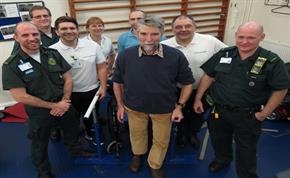
A man who lost his leg after a life-threatening motorcycle accident has received an early Christmas visit from the “angels” who saved his life.
Two frontline crews visited Geoffrey Blower at Southend University Hospital’s walking school – where the 76-year-old motorcycle enthusiast is making great strides in his recovery.
Speaking about EEAST team that came to his aid, Geoffrey said: “They are angels. If it wasn’t for them I wouldn’t be here now.”
The grandfather-of-three was taken to the Royal London Hospital after a collision with a car at the junction of London Road and Victoria Avenue in Rayleigh on June 17. He was thrown around eight metres from his Honda 175 into metal railings and suffered multiple injuries, including an open leg fracture and a fractured pelvis.
Ian Callow, the first paramedic on scene, said: “His leg was in a very bad way and he was in a lot of pain. He had a suspected internal haemorrhage and his blood pressure was very low which meant he needed treatment there on the road.”
A back-up crew of Chris Keeliher and Ian Jones who are both based in Rayleigh arrived shortly after to assist, along with Officer Steve Ferrant and voluntary BEARS (BASICS Essex Accident Rescue Service) doctor, Paul Gates. “It was a real team effort” said Ian when he visited Geoffrey at the walking school’s Christmas party. “Taking all his injuries into consideration he was in a life-threatening condition.”
Kevin Shreeve, a physiotherapist at the walking school, said Geoffrey is making good progress and could be walking unaided within three months if his recovery goes well. He said: “He’s doing quite well considering he has recently had an amputation. When his leg feels comfortable he is happy to walk. At the moment he is walking with a frame and two crutches. We will try to progress him to a single walking stick.”
Geoffrey has backed the award-winning CRASH card scheme, initially launched in Essex in 2009. Cards are placed in a motorcyclist's helmet and contain medical and personal details so that emergency services and others can act in the best interests of a casualty.
Geoffrey said: “It’s best to always carry some ID so if it enables you to get faster treatment then it will help.”
For more information on the CRASH card scheme, visit www.crashcard.co.uk.
Published 29th December 2014